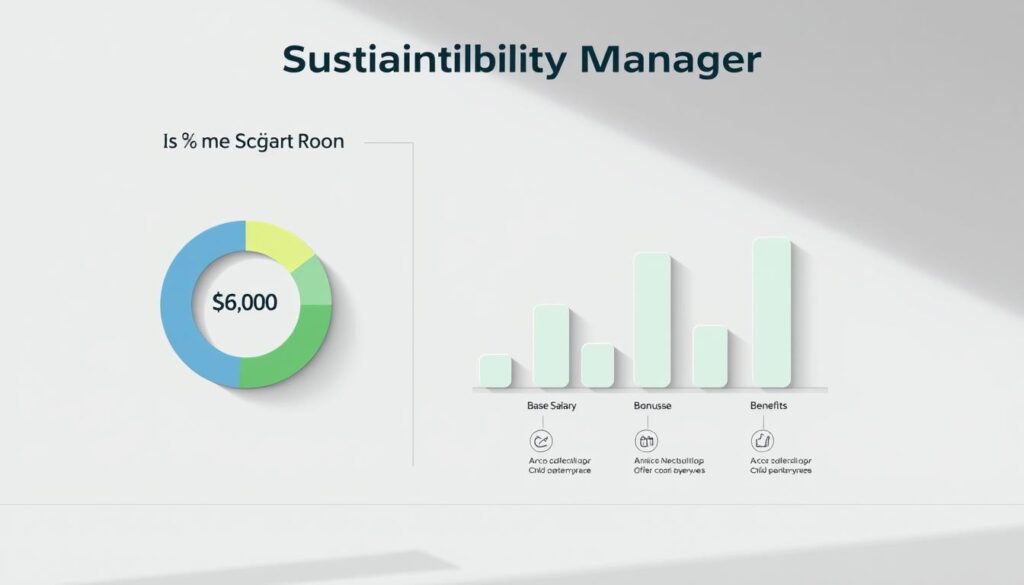As a professional looking to make a difference in the corporate world, you’re likely aware of the growing demand for ESG roles. Companies are now prioritizing environmental, social, and governance initiatives, and the job market is responding accordingly. For instance, Sonoco’s recent job posting for an ESG Controller highlights the importance of developing strategies for regulatory compliance in the ESG landscape.
You can capitalize on this trend by exploring lucrative sustainability careers. With salaries reaching up to $90,000 or more, these positions offer financial rewards alongside the opportunity to drive positive change.
Key Takeaways
- ESG roles are in high demand in corporate settings.
- Salaries for sustainability professionals can reach up to $90,000+.
- Companies prioritize environmental, social, and governance initiatives.
- Regulatory compliance is a key aspect of ESG roles.
- Lucrative career opportunities are available for those in the field.
The Rising Demand for Sustainability Managers
The job market is witnessing a remarkable growth in sustainability manager positions, with companies increasingly investing in ESG roles. This trend is driven by the growing importance of environmental, social, and governance factors in corporate strategy. As a result, sustainability careers are becoming more attractive, offering lucrative opportunities for professionals looking to make a difference.
Why Companies Are Investing in ESG Roles
Companies are investing heavily in ESG roles because they recognize the value of sustainability in long-term success. ESG considerations are no longer peripheral but central to business operations, influencing everything from risk management to brand reputation. By hiring sustainability managers, companies can better navigate the complex landscape of environmental regulations, social expectations, and governance standards.
Growth Projections for Sustainability Careers Through 2030
The growth prospects for sustainability careers are promising. According to market trends, the demand for ESG professionals is expected to continue rising through 2030. Here’s a snapshot of what the growth could look like:
| Year | Projected Growth in ESG Jobs |
|---|---|
| 2025 | 15% |
| 2027 | 25% |
| 2030 | 40% |
This growth indicates a significant shift towards sustainability in the corporate world, offering numerous opportunities for professionals in this field.
What Exactly Do Sustainability Managers Do?
You might be wondering what a sustainability manager does on a daily basis. In essence, they are responsible for developing and implementing environmental strategies within their organization.
Key Responsibilities and Daily Tasks
Sustainability managers have a multifaceted role that includes various tasks and responsibilities. Their daily activities can be broken down into several key areas.
Environmental Impact Management
One of the primary responsibilities of a sustainability manager is to manage the environmental impact of their organization. This involves:
- Conducting audits to identify areas of improvement
- Developing strategies to reduce waste and emissions
- Implementing sustainable practices across the organization
Stakeholder Engagement
Sustainability managers must also engage with various stakeholders, including employees, investors, and external partners. This involves:
- Communicating the organization’s sustainability goals and progress
- Collaborating with different departments to integrate sustainability into business operations
- Reporting on ESG metrics and compliance
Impact on Corporate Strategy and Operations
Sustainability managers play a crucial role in shaping corporate ESG strategies. Their work influences not only environmental policies but also overall business operations.
| Area of Impact | Description |
|---|---|
| Strategic Planning | Sustainability managers contribute to long-term planning by integrating ESG considerations. |
| Operational Efficiency | They identify opportunities to improve efficiency and reduce costs through sustainable practices. |
| Risk Management | Sustainability managers help mitigate environmental and social risks associated with business operations. |
For instance, the ESG Controller job at Sonoco involves developing strategies for ESG regulatory requirements and collaborating with various functional leaders, demonstrating the significant impact of Sustainability Managers on corporate strategy.
Sustainability Manager Jobs: Salary Breakdown by Industry
As a Sustainability Manager, your salary can differ greatly depending on the industry you work in. The financial rewards for ESG professionals are significant, with certain sectors offering salaries ranging from $100,615 to $129,362, as seen in job postings like the one at HMSHost for a Field HR Business Partner.
Top-Paying Sectors for ESG Professionals
Some of the top-paying sectors for Sustainability Managers include:
Technology and Finance Leaders
The technology and finance sectors are among the highest payers for Sustainability Managers. Companies in these industries often have large ESG initiatives, requiring professionals to manage and implement sustainable practices.
Manufacturing and Energy Sector Opportunities
The manufacturing and energy sectors also offer lucrative opportunities for Sustainability Managers. These industries are under increasing pressure to reduce their environmental impact, making the role of Sustainability Managers crucial.
| Industry | Average Salary Range |
|---|---|
| Technology | $120,000 – $150,000 |
| Finance | $110,000 – $140,000 |
| Manufacturing | $100,000 – $130,000 |
| Energy | $105,000 – $135,000 |
Regional Salary Variations Across the US
Regional variations also play a significant role in determining salaries for Sustainability Managers. Cities with a high cost of living, such as New York or San Francisco, tend to offer higher salaries to compensate.
“The role of a Sustainability Manager is not just about reducing environmental impact; it’s also about creating business value.” –

Understanding these variations can help you make informed decisions about your career as a Sustainability Manager.
Essential Qualifications for High-Paying Sustainability Roles
To succeed in high-paying sustainability roles, you need a specific set of qualifications. As the demand for sustainability professionals continues to grow, having the right education and certifications can significantly boost your career prospects.
Educational Requirements and Degrees
Most high-paying sustainability roles require at least a bachelor’s degree in a relevant field such as environmental science, sustainability, or business with a focus on ESG (Environmental, Social, Governance). Some positions may even require a master’s degree or MBA with a specialization in sustainability.
Certifications That Boost Your Market Value
Certifications play a crucial role in enhancing your market value in the sustainability sector. Two key areas to focus on are:
LEED and Other Green Building Credentials
LEED (Leadership in Energy and Environmental Design) certification is highly regarded in the industry. It demonstrates your expertise in green building practices and sustainable design. Other credentials like WELL AP (WELL Accredited Professional) also add significant value.
ESG-Specific Certifications Worth Pursuing
For ESG professionals, certifications like the Certified ESG Professional designation can be highly beneficial. These certifications show that you have the knowledge and skills to manage ESG factors effectively, making you a more attractive candidate for high-paying roles.
Building the Right Skill Set for ESG Success
To excel in ESG roles, you need to develop a robust skill set that combines technical expertise with soft skills. As highlighted in the job description for the ESG Controller at Sonoco, strong financial, accounting, and management skills are crucial, along with expertise in implementing internal controls over financial reporting.
Technical Skills Every Sustainability Manager Needs
Technical skills are the backbone of any successful ESG strategy. Two key areas of focus are:
Data Analysis and Reporting Capabilities
Sustainability managers must be able to collect, analyze, and report ESG data effectively. This involves using various tools and software to track performance metrics and create comprehensive reports.
Regulatory Knowledge and Compliance Expertise
Staying up-to-date with evolving regulations and ensuring compliance is critical. This includes understanding reporting requirements and implementing internal controls to mitigate risks.
Soft Skills That Set Top Earners Apart
While technical skills are essential, soft skills can differentiate top earners in ESG roles. Key soft skills include:
- Effective communication to stakeholders
- Collaboration and teamwork
- Strategic thinking and problem-solving
| Skill Category | Key Skills | Importance Level |
|---|---|---|
| Technical Skills | Data analysis, regulatory knowledge | High |
| Soft Skills | Communication, collaboration, strategic thinking | High |
Breaking Into the Field: Entry Points for Aspiring Sustainability Managers
For those looking to enter the field of sustainability management, there are multiple pathways to consider. Sustainability manager jobs are becoming increasingly available as companies prioritize environmental, social, and governance (ESG) practices.
Transitioning from Related Professions
Many professionals transition into sustainability management from related fields such as environmental science, HR, or operations. For instance, an HR manager with experience in diversity and inclusion initiatives can leverage their skills to drive sustainability efforts within an organization.
Starting Positions That Lead to Management Roles
Entry-level positions in sustainability often involve data collection, reporting, and project support. These roles provide a foundation for understanding the intricacies of sustainability management and can lead to more senior positions over time.

Volunteer and Project Experience That Counts
Volunteering for sustainability projects or participating in corporate social responsibility initiatives can provide valuable experience. For example, a professional might volunteer to lead a community garden project, demonstrating their ability to manage sustainability initiatives.
| Entry Point | Description | Potential Career Path |
|---|---|---|
| Related Profession Transition | Leverage existing skills from fields like HR or environmental science. | Sustainability Manager, ESG Specialist |
| Entry-Level Sustainability Roles | Data collection, reporting, and project support. | Sustainability Director, Corporate Social Responsibility Manager |
| Volunteer/Project Experience | Leading or participating in sustainability projects. | Sustainability Consultant, ESG Analyst |
By understanding these entry points, aspiring sustainability managers can better navigate their career paths and capitalize on the growing demand for sustainability manager jobs.
How to Craft a Standout Sustainability Resume
Crafting a standout sustainability resume is crucial for landing high-paying ESG roles. Your resume is often the first impression you make on potential employers, so it needs to be impactful.
Highlighting Relevant Experience and Achievements
To stand out, your resume must highlight relevant experience and achievements in sustainability. Focus on specific accomplishments, such as “Reduced carbon footprint by 25% through implementing sustainable practices.” Use action verbs like “managed,” “created,” and “developed” to describe your roles.
Keywords and Phrases That Get Past ATS Systems
Many companies use Applicant Tracking Systems (ATS) to screen resumes. To get past these systems, incorporate relevant keywords from the job posting, such as “sustainability reporting” or “ESG metrics.” A quote from a sustainability expert emphasizes the importance of keywords: “
Tailoring your resume with the right keywords is like giving your application a passport to the next round.
Portfolio Elements That Showcase Your ESG Impact
Include portfolio elements that demonstrate your ESG impact, such as case studies or project descriptions. For example, you might describe a project where you “Improved energy efficiency by 30% through sustainable design.” This not only shows your skills but also your ability to drive real change.
Networking Strategies for ESG Professionals
For ESG professionals, networking isn’t just about making connections – it’s about building relationships that can propel your career forward. Effective networking can open doors to new opportunities, provide insights into industry trends, and help you stay ahead in the competitive ESG landscape.
Industry Organizations Worth Joining
Joining industry organizations is a great way to expand your professional network. Organizations such as the Global Association of Risk Professionals (GARP) and the Sustainability Accounting Standards Board (SASB) offer valuable resources, including conferences, webinars, and networking events.
Leveraging LinkedIn for Sustainability Connections
LinkedIn is a powerful tool for ESG professionals. By participating in relevant groups, such as Sustainability Professionals or ESG Professionals Network, you can connect with like-minded professionals, share insights, and stay updated on industry news.
Conferences and Events That Open Doors
Attending conferences and events is crucial for networking in the ESG space. Some notable events include the ESG Global Summit and the Sustainability Summit. These events provide opportunities to meet industry leaders and learn about the latest trends.
| Event | Location | Focus Area |
|---|---|---|
| ESG Global Summit | New York | ESG Strategies |
| Sustainability Summit | London | Corporate Sustainability |
| GreenTech Conference | San Francisco | Innovation in Sustainability |
Acing the Sustainability Manager Interview
Acing a Sustainability Manager interview requires a deep understanding of ESG factors and the ability to articulate your vision for sustainable business practices. As you prepare, focus on demonstrating your expertise in environmental, social, and governance issues, as well as your ability to drive change within an organization.
Common Interview Questions and Winning Responses
To succeed, you need to be prepared for common interview questions that assess your ESG knowledge and problem-solving skills. For instance, you might be asked, “How would you integrate ESG considerations into our company’s supply chain?” A strong response could involve discussing a specific framework or standard, such as the Task Force on Climate-related Financial Disclosures (TCFD), and explaining how you would apply it to identify and mitigate risks.
Demonstrating Your ESG Knowledge
When demonstrating your ESG knowledge, it’s essential to show a grasp of current trends and regulations. As Andrew Savage, ESG expert, notes, “The ability to understand and communicate the business case for ESG is critical.” You can highlight your knowledge by discussing recent developments in ESG reporting or sustainability standards.
Showcasing Problem-Solving Abilities
Problem-solving is a crucial skill for Sustainability Managers. Be prepared to answer scenario-based questions that test your ability to analyze complex issues and develop effective solutions. For example, “How would you handle a situation where a key supplier is not meeting our ESG standards?” A winning response might involve outlining a step-by-step approach to addressing the issue, including stakeholder engagement and collaboration.

Case Studies and Scenarios to Prepare For
Preparing case studies and scenarios can help you effectively demonstrate your skills. Consider developing examples that showcase your experience in managing ESG projects or driving sustainability initiatives. As
“The future of sustainability is not just about reporting; it’s about integrating ESG into the DNA of the organization,”
said
. By preparing relevant examples, you can show your ability to integrate ESG into business operations.
Negotiating Your $90K+ Sustainability Salary
As you prepare to negotiate your Sustainability Manager salary, it’s essential to come armed with the right data and strategy. Knowing the market standards and being confident in your worth are crucial elements in securing a top salary.
Research Tactics for Salary Discussions
To negotiate effectively, you need to research the market thoroughly. Utilize online resources such as job postings and salary databases to understand the average salary range for Sustainability Managers in your industry. For instance, a job posting for a Field HR Business Partner B at HMSHost listed a salary range of $100,615 to $129,362, giving you a clear idea of the financial rewards in certain roles.
Beyond Base Pay: Benefits and Perks to Consider
When negotiating your salary, don’t forget to consider benefits and perks beyond your base pay. These can include:
- Additional vacation days
- Flexible working hours
- Professional development opportunities
- Performance bonuses
Timing Your Ask for Maximum Impact
The timing of your salary negotiation can significantly impact the outcome. Consider negotiating during your performance review or when you’ve achieved a significant milestone in your role. Being strategic about when you ask can make a substantial difference.
| Negotiation Timing | Impact |
|---|---|
| During performance review | High |
| After achieving a significant milestone | High |
| At the end of the year | Medium |
Career Advancement: From Manager to Director and Beyond
Advancing from a Sustainability Manager to a Director or beyond requires strategic planning and skill development. As you progress in your ESG career growth, understanding the typical career path and opportunities for advancement is crucial.
Typical Career Progression in Sustainability
Career progression in sustainability roles can vary, but a common path involves moving from a Sustainability Manager to a Senior Sustainability Manager, then to a Director of Sustainability, and potentially to a Chief Sustainability Officer (CSO) or other executive roles. Your ability to adapt to new challenges and continuously develop your skill set will be key to your advancement.
Strategies to Accelerate Your ESG Career Growth
To accelerate your ESG career growth, focus on developing a strong network within the industry, staying updated on the latest sustainability trends, and acquiring relevant certifications. Consider taking on high-visibility projects that demonstrate your capabilities and impact.
| Career Stage | Typical Responsibilities | Skills Required |
|---|---|---|
| Sustainability Manager | Project management, reporting | Project management, data analysis |
| Senior Sustainability Manager | Strategy development, team leadership | Leadership, strategic thinking |
| Director of Sustainability | Executive leadership, stakeholder engagement | Executive presence, stakeholder management |
When to Consider Changing Companies for Advancement
If you find that your current organization has limited opportunities for advancement, it may be time to consider changing companies. Look for organizations with a strong commitment to sustainability and a clear path for career progression. Sometimes, a lateral move can be a strategic step towards a more senior role in the future.
Conclusion: Your Path to a Rewarding Sustainability Career
As you’ve seen, the demand for sustainability professionals is on the rise, with corporate ESG roles offering salaries of $90K+. Pursuing a career as a sustainability manager can be a financially rewarding and fulfilling path.
To succeed in sustainability manager jobs, focus on building a strong skill set, including technical skills and soft skills that set top earners apart. Consider obtaining certifications that boost your market value and leverage industry organizations to expand your network.
By understanding the key responsibilities of sustainability managers and the impact they have on corporate strategy and operations, you can position yourself for success in corporate ESG roles. With the right qualifications, experience, and networking, you can unlock a lucrative and rewarding career in sustainability management.